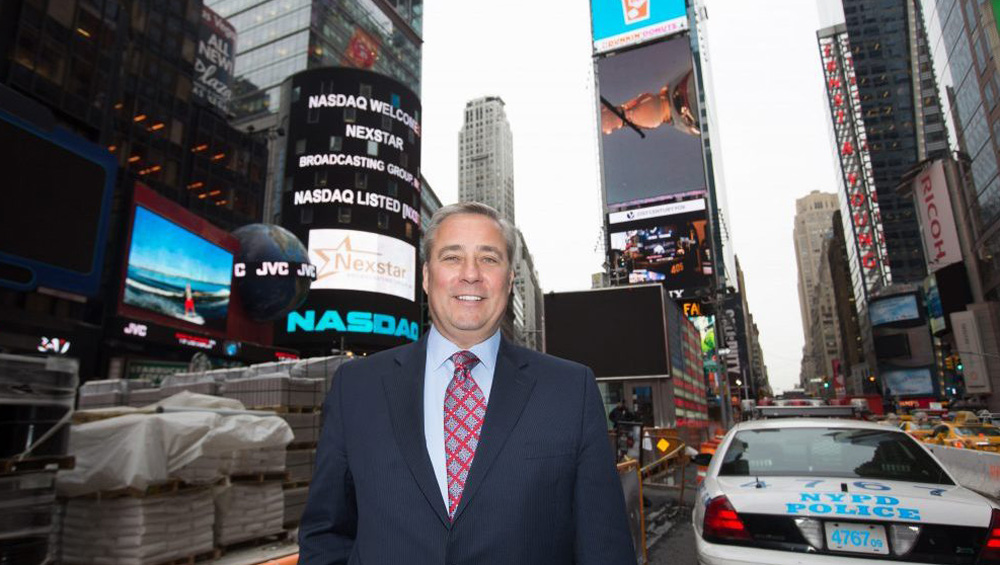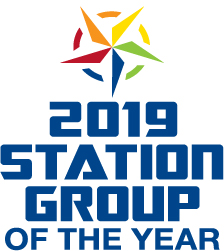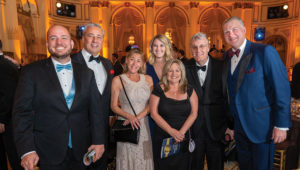
Station Group Of The Year | Sook: A Long, Long Way From Punxsutawney

At 61, Perry Sook, CEO of TVNewsCheck’s Station Group of the Year, Nexstar Media, has the look, the voice and demeanor — the gravitas, some would say — of a high-priced news anchor in a top market. (Read the Station Group of the Year profile here.)
And had he had any less business acumen, industriousness and taste for greater rewards that makes for a good entrepreneur, he might be one today.
In fact, among his first jobs out of Ohio University in 1980 with a degree in communications was as a rip and-read anchorman at WDTV Clarksburg, W.Va.
But that experience only confirmed to him that he had no “journalistic ink running through my veins” and that he was best suited for the business side where the money was better and he would have “some sense of control — of being able to manage rather than being managed.”
 NAB President Gordon Smith, who has gotten to know Sook well from his years serving on the NAB board, says Sook’s “story is really the quintessential, boot-strap, Horatio Alger story of American success.”
NAB President Gordon Smith, who has gotten to know Sook well from his years serving on the NAB board, says Sook’s “story is really the quintessential, boot-strap, Horatio Alger story of American success.”
That story began with a love of broadcasting. As a boy growing up in DuBois, a town in a distant orbit of Pittsburgh, he wanted to be Bob Prince, the legendary voice of the Pirates. He was the PA announcer at Little League games and reported scores of games for a local radio station.
In high school, he got his first real job in radio at a station 18 miles away in Punxsutawney, doing Little League play by play, selling some time and “anything else the owner wanted me to do.”
It wasn’t particularly lucrative, he says. “All the money I made in commissions I put back into the family’s Chrysler New Yorker, which I was using to drive all around Jefferson County to make sales calls.”
While at Ohio University in Athens, he kept at broadcasting, spinning records at a local radio station and doing play-by-play for the college teams. As a communications major, he had a choice of either the journalism, production or business “sequence.” He opted for business.
After graduation and the uninspiring stint as a small-market anchor, he landed a sales job at WOWK Huntington, W.Va., then an ABC affiliate. (Sook likes to point out that in 2015 he bought the station along with three others of West Virginia Media Holdings for $130 million.)
Sook’s next stop was back in Western Pennsylvania, as an account executive at WPXI Pittsburgh, Cox’s NBC affiliate. It was notable for more than career development. Before moving on to Cox’s Telerep in Philadelphia, he proposed to a woman he met during his freshman year at Ohio University on the station’s helicopter pad. He and Sandra Thomas would marry and have three children.
In 1985, Sook left Cox to become national sales manager at KTVT Dallas, then one of broadcasting’s great independent stations with highly rated news, top off-net shows, Rangers baseball and Mavericks basketball. It was distributed by United Video as a superstation to cable systems throughout the Southwest.
Moving up the career ladder, Sook became general sales manager at crosstown KXTX, another independent then owned by Pat Robertson that was built mostly on kids programming.

Last February, the Broadcasters Foundation of America presented Perry Sook with its prestigious Golden Mike Award at a New York gala. Among Sook’s guests were staffers from Nexstar’s WMBB Panama City, Fla., which suffered a direct hit by Hurricane Michael a year ago. Pictured (l-r): Chris Golden, creative services di-rector, WMBB; Sook; Stacie Bolster, account executive, WMBB; Kelly Grosfield, reporter-anchor, WMBB; Lisa Quirk, account executive, WMBB; Terry Cole, GM, WMBB; Tim Busch, president, Nexstar.
It was during this time that Sook began thinking like an entrepreneur. “I was driving out to Big Spring and other little communities to look at radio stations on the weekend just to see if I could figure out a way to buy them.
“I didn’t act on it right away. I was still progressing through the sales management and group ranks at that point in time, but I was doing that when I was 27 years old, driving out looking for little radio stations on the weekend that had ads in the back of Broadcasting or Billboard.”
In 1990, he was recruited to run Seaway Communications, a two-station group (WVII Bangor, Maine, and WJFW Rhinelander, Wis.) that was minority-owned, but overseen by Tom Murphy and Dan Burke of CapCities.
Unfortunately, according to Sook, the company was paralyzed by the inability of the oversized 13-person board to make decisions. Nonetheless, Sook says the Seaway experience proved invaluable because it exposed him to the CapCities executives and, through them, other prominent broadcasters.
“I spent time with Dan Burke, even though they were in the midst of buying ABC at the time. He was giving me management advice and counsel up and down the line. They opened a lot of doors for me that a kid running a small TV company would otherwise not have had.”
And it taught him a great lesson: TV stations were trading for less than they were worth.
So, with Seaway fizzling, Sook in 1991 decided to strike out on his own, to form his own station group. With $250,000 of his own money and the backing of three private equity funds that kicked in $5 million apiece, he formed Nexstar progenitor Superior Communications.
“I spent a year running around the country looking for stations to buy and looking for money to buy them,” he says.
He found and bought WDKY Lexington, Ky., and KOCB Oklahoma City. They were little more than “video jukeboxes” in need of repair, he says. So, he invested in programming and sales software and actively managed them. “You know, good old-fashioned blocking and tackling and being present every day.”
The fixes worked. Superior sold the stations he bought for $23 million in 1991 and 1992 for $63 million in 1995 and 1996. Sook walked away with “seven figures,” he says.
A footnote to the Lexington buy: It was owned by one-time CBS President John Backe, Sook says. “There were a number of deadlines that I missed where he could have kept my $350,000 down payment that came out of my own pocket and walked away, but, for whatever reason, he did not. He gave me the opportunity to get the deal closed, and for that I will be forever grateful.”
So, Sook had some money that he was ready to parlay, but he needed a financial partner with deeper pockets than he had at Superior. Abry Communications, another private equity firm, heeded his call and made a $30 million commitment. Nexstar was born.
The first buy: WYOU Wilkes-Barre/Scranton, Pa., for around $21 million. It’s still in the Nexstar fold.
Next came stations in St. Joseph, Mo.; Terre Haute, Ind.; Joplin, Mo.: Beaumont-Port-Arthur, Texas; Wichita Falls, Texas; Erie, Pa.; and, over the next two decades, 190 more.
A pivotal moment came when Sook decided to take the company public in 2003. He says he has no regret about the loss of independence. Maxed out on how much the company could borrow, it was the only way he could keep on buying.
“It gave us access to a whole other line of capital and, while we complain about it, the rigor of being a public company and having to report and have sterling financials and all those things, I think those are good disciplines for a company this size.”
As a station consolidator, Sook’s two biggest plays both came within the last three years. First, in 2016, he outmaneuvered Meredith to acquire Media General and its 71 stations for $4.6 billion. Then, when Sinclair’s bid to buy Tribune ran aground at the FCC, he stepped in with a $4.1 billion offer. That boosted the group’s household reach from 39% to 63%.
Sook has been a party to a lot of deals — more than 30, by one count — and has earned a reputation as a good man with whom to deal. “He is relentless and pursues stations with a passion, says broker Larry Patrick, who has sat across the table from him. “But he is straightforward, does not play games and tries to make a deal that is fair for both parties.”
Soo Kim, the investor who controlled Media General when it merged with Nexstar, says that what impressed him in the negotiations was Sook’s willingness to relinquish management to get the deal done. “It really didn’t matter to him who would run [the merged company]; it was what makes sense and adds value for everybody.”
In the end, Sook did emerge as the top manager and it was probably for the best, Kim says. “He runs a much leaner shop than Vince would have.” Vince Sadusky, now CEO of Univision, was CEO of Media General at the time.
Broadcasting has been good to Sook. It has made the boy from DuBois a wealthy man. Under his new employment contract signed in January, he is due salary and bonus of $4.9 million this year plus additional shares. Counting such awards, he says he owns about three million of Nexstar’s 46 million outstanding shares. Each of those shares now sells for around $100 and the consensus on Wall Street is that the price could go to $150 or more.
But Sook has also been good to broadcasting. In 2005, he helped to transform the economics of TV businesses by taking a determined stand on retransmission consent, demanding that cable operators pay to carry his broadcast signals.
After several months the operators acceded to his demands, establishing the principle of cash for carry. What began as a trickle has become a river, not only for Nexstar, but for other broadcasters who followed Sook’s lead. In 2018, retrans contributed $1 billion to Nexstar’s revenue line and more than $10 billion to the industry’s.
Colleagues describe Sook as an even-tempered man whose directness is leavened by a sense of humor and affability. Nexstar Broadcasting President Tim Busch, who has worked alongside him for 19 years, says there may be a “dash of ego” in him, but that other qualities define him as a businessman and entrepreneur. “I’ve always said that there were four things that attracted me to Perry — his vision, his enthusiasm, his focused plan and the fact that he is very smart.”
Sook has slowly emerged as an industry leader over the years, taking on increasing responsibilities as his station count has mounted. One who appreciates it is Hearst Television President Jordan Wertlieb. “He has not been shy to represent broadcasters on the affiliates board, TVB or the NAB. Those are not paid jobs, but they are critically important as we advance on the regulatory front and commercial front with regard to advertising and distribution.”
TVB President Steve Lanzano has been an active contributor to the association’s work, taking a turn as the chairman and pushing automated selling initiatives. “He’s always been progressive, always looking at what we need not just now but in two, three or four years.”
NAB’s Smith says that when he thinks of Sook, two words come to mind: growth and engagement. “Growth defines his leadership of Nexstar and engagement describes his attention to detail, his ferocious work ethic and his effective advocacy.”
“I have watched with admiration his constant presence on the Hill and local communities working with elected officials on behalf of broadcasting,” Smith says. “He has a good head for politics, and he plays it straight down the middle in a bi-partisan fashion. He has friends on both sides of the aisle because he shows up for them and he knows how to ask for the vote.”
Smith says Sook recognizes the importance of politics to the Nexstar business. He was the first CEO to invite him to speak to station general managers about the importance of engaging politically and contributing to the NAB PAC.
Sook has also proved adept at the sometimes tricky NAB politics in large part because he got off to a good start. Soon after Smith joined the NAB, Smith says, Sook said he would join but only if he were guaranteed a board seat. Smith says he was able to persuade Sook to follow established bylaws. “I was impressed by his willingness to stop, listen and learn about how to improve at intra-industry politics by coming on in the right way rather than a pre-condition of his joining. There are not a lot of entrepreneurs you can teach.”
Now consumed with integrating Tribune into the Nexstar whole and figuring out what to do with the whole, Sook seems to be moving as fast as he ever has. But there is more to Sook than broadcasting.
He is active with the Ohio University alumni, currently chairing the fundraising foundation and rooting for the Bobcats. He and Sandy have their name on the academic center for the student-athletes that opened last fall.
He occasionally golfs and holds season tickets to the Dallas Cowboys, although he still has a soft spot for his hometown Steelers.
And, of course, there is room for wife Sandy and the rest of the family. He enjoys his daughter Laura’s children and attending performances of his children Victoria and Perry, who have growing lists of acting credits in New York and elsewhere.
TVNewsCheck’s 2019 Station Group of the Year Award is only the latest to crowd his mantle. He is a member of Broadcasting & Cable’s Hall of Fame, he is among the Library of American Broadcasting’s Giants of Broadcasting and Electronic Arts and he a recipient of the Broadcasters Foundation of America’s Golden Mike.
The BFOA is broadcasting’s principal charity. In February, at the Golden Mike dinner in New York, Sook and his wife presented foundation President Jim Thompson with a check for $100,000. “That has never happened to me before,” Thompson says. “I was floored.”
Sook has built Nexstar to last. He expects it to be among the handful of major station groups still standing after the final round of deregulation and consolidation.
“I now am looking at the generation of leaders that I have and the generation of leaders behind them to set this up as a sustainable, growing and prospering company even after my tenure,” he says.
“I don’t anticipate going anywhere anytime soon, but I am also not going to be here when I am in my 90s and nodding off in board meetings.”
































Comments (0)